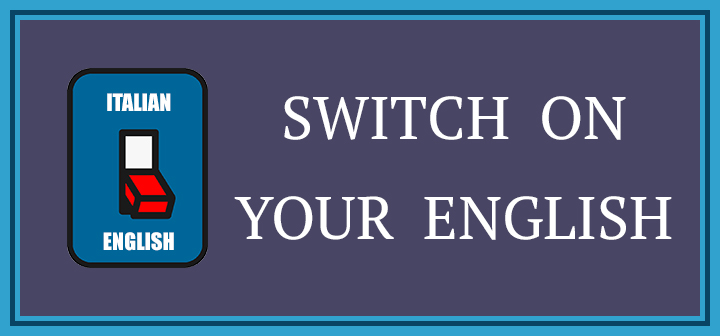La traduzione, come metodo di esercizio nell’apprendimento di una lingua, farà sicuramente parte della vecchia scuola, però, inserita in un contesto più vario di apprendimento, soprattutto con feedback in tempo reale, può sempre essere un utile esercizio di allenamento.
Consiglio una partecipazione attiva e visibile postando la tua versione tra i commenti in fondo a questa pagina. In questo modo riceverai un mio commento o suggerimento in tempo più o meno reale. Ma per chi non se la sente, si può semplicemente annotare la propria versione e controllarla attraverso i miei commenti lasciati per gli altri.
Ecco la nuova frase:
Sarebbe meglio muoverci. Abbiamo ancora parecchia strada da fare.
Buon divertimento!
Puoi esercitarti quanto vuoiQUI
Your comments are always very welcome.





It would be better to go on. We still have a long road to drive. I don’t know if it is right….I wish you “good Easter”. Peace and love.
LikeLike
Hi Nadia.
“It would be better…” is a good start but I would then use an expression like “to get going” or “to get a move on”.
In the second part, “We still have a long…” is a good start but then you need the expression “way to go.”
🙂
LikeLike
Wishing you a Happy Easter 🔔🕊️
LikeLiked by 1 person
Thanks Luisa. And you! Peace and rest! 🙂
LikeLiked by 1 person
❣️🕊️❣️
LikeLiked by 1 person
Sarebbe meglio muoverci. Abbiamo ancora parecchia strada da fare.
Hi down there 😊
It would be better to get a move on. We still have a long way to go.
LikeLiked by 1 person
Very nice, Roby. Well done! 🙂
LikeLike
Thank you prof☺️.
Have a nice evening…
LikeLike
And you. And happy Easter! 😘
LikeLike
We would be better move. We still have a long way to go.
LikeLike
Hi Luigi. The second part of your version is perfect but the first part needs some rethinking. There is a ‘personal’ way of doing it (starting with ‘we’ but not ‘would’) and an impersonal way of doing it (starting with ‘it’).
Try again or look at some of the other versions here for inspiration!
LikeLike
Thanks👍
LikeLike
😀👍
LikeLike
Sarebbe meglio muoverci. Abbiamo ancora parecchia strada da fare.
It would be better for us to move! We still have a long way ahead
LikeLike
Well done, Manu. That’s a perfectly acceptable version.
Perhaps you would like to consider two possible improvements:
to move ➝ to get moving
ahead ➝ to go
🙂
LikeLike
Thanks Tony;
I had better study much more …
I wish you a happy Easter
LikeLiked by 1 person
Thanks Manu, and you! 🙂
LikeLike
We would better move on. We still have a long way to go.
LikeLike
The ‘personal’ version is with ‘had’ not ‘would’, Dino: “We had better move on.”
🙂
LikeLike
È strano, capitano tutte a me: sono convinto di aver scritto “ had” non would . D’altra parte sarebbe stato anche più logico…. Credo! Grazie comunque .
LikeLike
Più ‘logico’ non so! Comunque… 😉
LikeLike
Ah, prof…Approfitto per cercare di chiarirmi un dubbio
Se fosse stato “Avremmo fatto meglio a muoverci”, io avrei tradotto “It would have been better to get moving (o to move)”.
Ecco la domanda: per rendere l’idea di qualcosa che sarebbe stato meglio fare nel passato, si puó usare una forma personale?
LikeLike
How about “should have + past participle”?
LikeLike
Thanks! I can’t tell you how useful your work is to me, prof!
So, doesn’t the better form work in this case?
LikeLiked by 1 person
“Should have + past participle” tends to sound a bit like a reproach (rimprovero), whereas “would have been better” has a more detached (distaccato) sound. Otherwise they’re pretty similar as far as meaning is concerned.
LikeLike
👍
LikeLike
Good morning prof
It should be better go on. We still have a lot of road to do. 🤔(maybe too much literal translation….)or The way is still long away
I don’t know, just an attempt
Thank you very much
Happy Easter
LikeLike
You’re a bit off target today, Nadia. Have a look at some of the other suggestions to see what the best solution might be here.
Happy Easter to you too. 🙂
LikeLike
We’d better get moving. We still have a long way to go.
LikeLiked by 1 person
That is the version that I would use, Ester, although there are others that are equally valid. Well done! 🙂
LikeLike
Thanks Prof, Happy Easter☺
LikeLiked by 1 person
You too! Don’t eat too much chocolate! 😉
LikeLike
It will be difficoult😂
LikeLike
Well, in that case, make sure you’ve got a good supply of bicarbonate of soda! 😂
LikeLike
Sarebbe meglio muoverci. Abbiamo ancora parecchia strada da fare.
It would be better to leave. We still have a long way ahead.
LikeLike
Your version works very well, Paolo, but there are other versions which might be even better both in the first part and in the second part.
LikeLike
It comes to my mind “We’d better go” for the first part, but nothing else…
I’ll have a look at the other answers!
LikeLike
“We’d better go” is perfect.
LikeLike
After seeing Ester, your favourite could be
“Sarebbe meglio muoverci. Abbiamo ancora parecchia strada da fare.”
“We’d better go. We still have a long way to go.”
Is it right?
LikeLike
If you use ‘go’, then I would add ‘now’, otherwise I would use an expression like ‘get moving’ or even ‘get going’.
LikeLiked by 1 person
Sarebbe meglio muoverci. Abbiamo ancora parecchia strada da fare.
It would be better we move on. We still have a long way to do (or go ? 🤔)
LikeLike
The first part doesn’t work, Dani. You can use the impersonal form to start with, but you need to think again about how to finish.
The second part is good, but with ‘go’, not ‘do’.
🙂
LikeLike
It would be better we leave. We still have a long way to go.
LikeLike
If you start with the impersonal form, use an infinitive for the second verb – it’s the easiest option. Otherwise you’ll end up complicating things with a second conditional!
You could try a different, personal formula at the beginning…
LikeLike
I see.
It would be better to leave. We still have a long way to go.
Thanks.
LikeLiked by 1 person
That’s good now but look at some of the other suggestions as well.
LikeLike